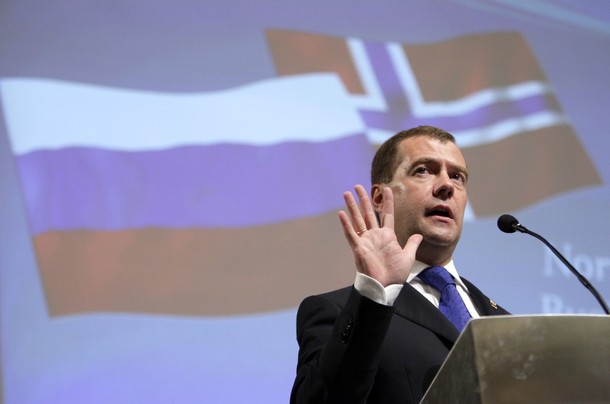
"The face of modern Russia is a smiling face,” Russian President Medvedev said on April 26. “But other countries must smile back at us.”
Lately news about Russia’s relations with the West has led to all sorts of speculation and comments.
I am thinking of the news relating to the Russian leadership attending ceremonies at Katyn and releasing documents about the Soviet role in the massacres; news about Russia concluding an Arctic border agreement with Norway after almost forty years of negotiations; about Medvedev’s successful visits to Norway and Denmark, two Nordic countries with which the Kremlin has had issues (and the first Russian visit of this kind to Copenhagen since 1964), as well as Russian overtures to Poland.
Some talk about a Russian “charm offensive.” Some ask whether we are dealing with “a new Russia.”
Some say the agreement with the Obama administration on a new START treaty in March is the reason why we see a softening of Russian attitudes in other areas. Undoubtedly the agreement has given the Russian leadership the pleasurable feeling of having a status of a great power equal to the United States – and more confidence in its ability to charm its way forward in relations with other countries.
It should be noted, however, that Medvedev occasionally still talks tough. As Dimitri Simes remarks, Medvedev is quoted as having said, "If somebody is bothered" in America by Moscow seeking a greater role in Latin America, “we want to spit on that." And that right after the nuclear security summit in Washington!
Last week some saw an explanation for the more conciliatory attitude in what the EU Observer has called a “classified Kremlin strategy paper” suggesting that Russia should build better relations with EU countries in order to rescue its economy.
How important is this new attitude if it persists? Its most significant aspect is perhaps that if it becomes a habit, it might facilitate talks about matters of mutual interest and make diplomatic contacts with Russia more pleasant — at least for some countries who are not seen as obstacles to Russian aspirations of dominating the energy scene in Europe.
However, while their tactics might change, there is most probably no change when it comes to Russian strategy. Simply put, the grand strategy of the Kremlin is to expand Russia’s influence globally and in the post-Soviet space.
The motives are mixed: post-imperial nostalgia, the eternal Russian fear of being encircled; fear of the infectious effect of democracy and the rule of law; a need to dominate the energy flows to Europe; and desire to be seen as one of the world’s leading powers and a regional hegemon.
I remember when the then-Swedish Foreign Minister Ola Ullsten at a bilateral meeting at the United Nations in 1980 asked the then-Soviet Foreign Minister Gomyko about Russian pressures on Poland. Gromyko’s stone-faced answer was: "If anybody has any questions about Poland, I ask them to look at the map."
Old notions such as 19th century geopolitics and Cold War ideas about the overwhelming importance of “the correlation of forces" are still pervasive in Russian strategic thinking.
How one should react depends on what relationship one has or wishes to have with the Kremlin.
Generally speaking, the United States and NATO have so far often bent over backward to conduct a friendly dialogue with a grumpy and suspicious Russian leadership. Medvedev’s request that the world smile back is therefore really not called for. Be that as it may, the West should of course respond to smiling Russian diplomacy as politely and constructively as before. However, we would be wise to remember the old limerick:
There was a young lady of Riga
Who smiled as she rode on a tiger;
They returned from the ride
With the lady inside,
And the smile on the face of the tiger.
So smile back, but don’t be taken for a ride.
Henrik Liljegren is an Atlantic Council Board member and former Ambassador of Sweden to the United States. Photo credit: Getty Images.
Image: 610x_6.jpg
